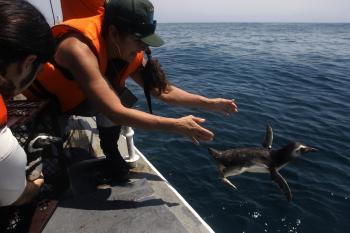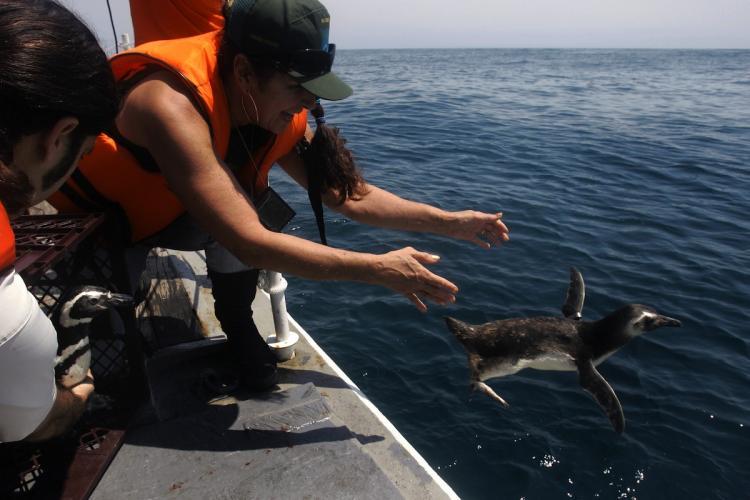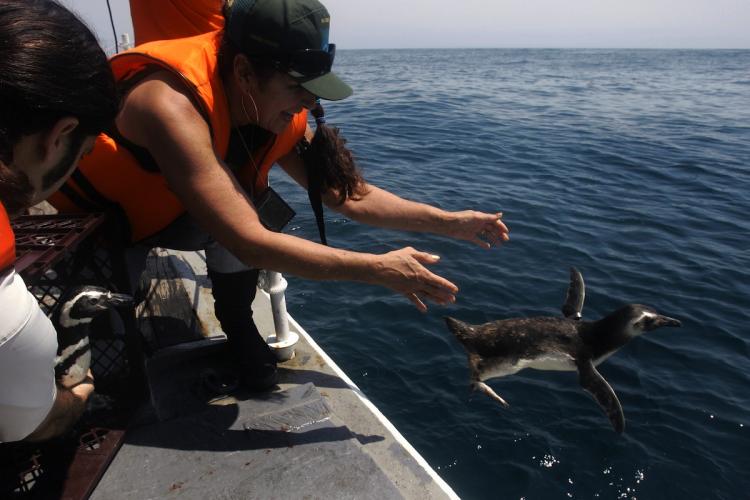RIO DE JANEIRO, Brazil—A long and daunting journey in pursuit of their diet of fish and squid into warmer waters became fatal for at least 500 penguins. The birds washed ashore on beaches in São Paulo, Brazil, at the beginning of this month scaring locals and environmentalists. In addition to penguins, turtles, dolphins and some seabirds were also found dead.
According to an initial investigation by the Brazilian Institute of Environment and Renewable Natural Resources (IBAMA) released late last week, the penguins died as a result of an abrupt temperature change in their migration waters.
However, regional chief of IBMA, Ingrid Maria Furlan Oberg, described the number of dead animals as still falling within the normal range for this time of the year, saying that the deaths are a result of natural causes.
“We believe that this happened because of the cold front, which brought them all at once,” said Oberg in a statement published by local newspaper Estadão.
“Last year we had a few stranded animals, but in 2008, it reached 1,000 dead penguins on the coast of São Paulo and another 1,000 in Bahia,” she said.
Oberg based her conclusions on meetings with veterinarians, biologists, researchers and environmentalists from the Center for Training and Research in the Environment (CEPEMA), connected to the University of São Paulo USP.
“The detailed examinations, [and] pathological analysis, will be finished only in 30 days, but there is nothing that indicates an abnormal cause for these deaths,” said Oberg in her statement published by the local newspaper Estadão.
She also said that the group that monitors stranded marine animals found no abnormal causes of death in examinations so far.
According to a statement from veterinarian Cristiane Lassálvia published by Folha Online newspaper, the appearance of penguins is common this time of year, as they flee the winter in Patagonia.
“In Patagonia, they consume Argentine anchovies, forming huge shoals, with hundreds of thousands of fish. But on the Brazilian coast, they find sardines, which are much faster than those anchovies and stay in smaller and more scattered shoals,” said Lassálvia.
Animals that washed ashore alive, are currently being treated at the aquarium on the coast of São Paulo and the Rehabilitation Center for Animals and Seabirds in Guaruja, Sao Paulo.
According to an initial investigation by the Brazilian Institute of Environment and Renewable Natural Resources (IBAMA) released late last week, the penguins died as a result of an abrupt temperature change in their migration waters.
However, regional chief of IBMA, Ingrid Maria Furlan Oberg, described the number of dead animals as still falling within the normal range for this time of the year, saying that the deaths are a result of natural causes.
“We believe that this happened because of the cold front, which brought them all at once,” said Oberg in a statement published by local newspaper Estadão.
“Last year we had a few stranded animals, but in 2008, it reached 1,000 dead penguins on the coast of São Paulo and another 1,000 in Bahia,” she said.
Oberg based her conclusions on meetings with veterinarians, biologists, researchers and environmentalists from the Center for Training and Research in the Environment (CEPEMA), connected to the University of São Paulo USP.
“The detailed examinations, [and] pathological analysis, will be finished only in 30 days, but there is nothing that indicates an abnormal cause for these deaths,” said Oberg in her statement published by the local newspaper Estadão.
She also said that the group that monitors stranded marine animals found no abnormal causes of death in examinations so far.
According to a statement from veterinarian Cristiane Lassálvia published by Folha Online newspaper, the appearance of penguins is common this time of year, as they flee the winter in Patagonia.
“In Patagonia, they consume Argentine anchovies, forming huge shoals, with hundreds of thousands of fish. But on the Brazilian coast, they find sardines, which are much faster than those anchovies and stay in smaller and more scattered shoals,” said Lassálvia.
Animals that washed ashore alive, are currently being treated at the aquarium on the coast of São Paulo and the Rehabilitation Center for Animals and Seabirds in Guaruja, Sao Paulo.




